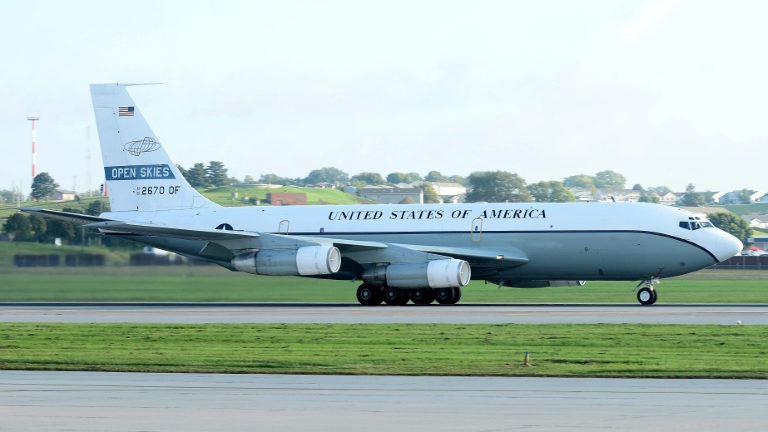
A U.S. Air Force OC-135 aircraft used for surveillance of Russia under the Open Skies Treaty. /AFP
A U.S. Air Force OC-135 aircraft used for surveillance of Russia under the Open Skies Treaty. /AFP
Editor's note: Yuan Sha is an assistant research fellow at the Department for American Studies, China Institute of International Studies. The article reflects the author's opinions, and not necessarily the views of CGTN.
As the U.S. finalizes its unilateral withdrawal from the Treaty on Open Skies, it is time to take stock of the Trump administration's legacy in the realm of international security.
Why withdraw?
While the U.S. government has put the blame on Russian violations, the real motive behind the U.S. withdrawal is that it sees the treaty as being of little strategic value.
The Treaty on Open Skies is an iconic arms control treaty that was signed in the immediate aftermath of the Cold War in 1992 and entered into force in 2002, allowing unarmed reconnaissance flights over the territories of signatory states to collect information on each other's military forces. The treaty is based on the rationale of improving transparency to reduce miscalculation, build confidence and alleviate security dilemmas.
With the rapid development of technologies however, the Open Skies Treaty has become more symbolic than substantive. To be specific, the covered areas under the treaty do not involve military facilities of true confidentiality. Countries could also use camouflage and other tactics to deceive others. Thus, it is doubtful that the treaty would truly boost transparency and confidence among rival countries.
Furthermore, the U.S. can now use advanced spy satellites in space to gather much more valuable and reliable intelligence on the Russian military. With less-developed reconnaissance capabilities, Russia is more reliant on the treaty. The U.S. also suspects Russia of using the treaty for propaganda purposes as Russia has maneuvered several high-profile flyovers above U.S. sensitive places. In a nutshell, the U.S. sees the treaty as asymmetric and against its national interest.
What are the implications?
The U.S. withdrawal from the treaty will have far-reaching implications for international security.

A Russian Air Force Tu-214 flies over Offutt Air Force Base on April 26, 2019. /AP
A Russian Air Force Tu-214 flies over Offutt Air Force Base on April 26, 2019. /AP
First, it will disrupt the regional security mechanism. The Open Sky Treaty is a multilateral treaty with 35 signatories, which is seen as a contributor to security and stability in Europe. In line with the "America First" doctrine, the Trump administration is clearly putting its own interest above that of its European allies. The U.S.'s credibility as a reliable security partner is further dampened.
Second, it will roll back the global effort on arms control. The Open Skies Treaty is widely seen as a positive and innovative development in the realm of arms control, aiming to reduce the chronic deficit in global security governance. U.S. unilateralism is setting a bad example by encouraging others to look after their self-interest, sacrificing the common good.
Third, the U.S. is sending a dangerous signal. Keen on preparing itself for the era of "great power competition," the U.S. is actively revamping the post-Cold War security arrangement. The U.S. has already torn up a number of arms control treaties, including the Anti-Ballistic Missile Treaty and the Intermediate Range Nuclear Forces Treaty. With the new move, the U.S. is signaling its confrontational approach to "strategic competitors."
Will Biden reverse this decision?
With the U.S. entering a flux period during the presidential transition, the question is will the incoming Biden administration reverse this decision?
As conventional wisdom goes, Joe Biden is more aligned with multilateral and institutionalism thinking. He promised to return to multilateral treaties, repair alliances and restore the U.S.'s global leadership. Biden and Democratic lawmakers criticized the Trump administration's decision to withdraw from the Open Skies Treaty as short-sighted. But aside from the rhetoric, how Biden might act is a complicated story.
He would face multiple constraints in returning to the treaty. Amid a raging pandemic, a slumping economy and rising social tensions, Biden would be prioritizing domestic problems. Constrained by a Republican-led Senate, he would also face pressure to reverse Trump decisions. As Democrats are more wary of Russians, it would not be easy to return to the treaty blindly.
Biden would reassess the costs and benefits before deciding whether the U.S. needs to rejoin the treaty. President Trump's calculations about the treaty are shared by many in the American strategic community, who have argued that it is out of step with current developments and the shifting balance of power. Biden might seize the opportunity to ask for more concessions from rivals and partners alike in renegotiating a new treaty.
This new development leaves the fate of New START, the only remaining arms treaty with Russia which is set to expire next February, hanging in the balance. What is worth noting is that every treaty is a hard-won achievement with years of dedication and goodwill from participating countries. A unilateralist approach will undermine international security and global confidence for many years to come.
(If you want to contribute and have specific expertise, please contact us at opinions@cgtn.com.)

